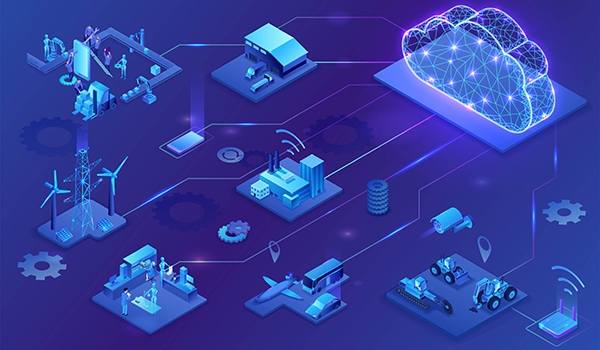Four Ways ERP Is Changing to Keep Up with Manufacturers’ Evolving Needs

Enterprise resource planning (ERP) has become a pivotal solution for withstanding today’s challenges. Here’s how the technology is evolving to ensure businesses can keep up with the current climate.
Businesses have endured two truths over the past two years: first, they’ve rediscovered the need to be an agile and resilient enterprise. Second, they’ve learned that if they can’t adapt quickly, they may not survive.
Manufacturers have been hit especially hard. McKinsey estimates that, over the next five years, under a quarter of all supply chains may relocate to improve resilience in the face of black swan events. This could help, but it will take time, a luxury few manufacturers possess.
What they need right now is to be able to depend on foundational process management solutions, including enterprise resource planning (ERP), to best manage and maintain business operations during this difficult period. And guess what: It’s working.
Our survey of SMB IT decision-makers found that nearly three-fourths (70%) of manufacturers use an ERP solution to drive their day-to-day operations. Nearly 95% say that their ERP helped them manage the impacts of the pandemic.
In other words, ERP has become a pivotal solution for withstanding today’s challenges, but the technology cannot rest on its laurels. ERP is therefore evolving to ensure businesses can keep up with the current climate. Here’s how:
Supporting smarter, better-informed decisions
There are two technologies leading the monumental shift in the growth of ERP: artificial intelligence (AI) and machine learning (ML). These technologies are providing the boost ERP needs to get smarter every year. As a result, businesses can use ERP systems to generate powerful actionable insights to increase equipment effectiveness, decrease downtime, and improve processes.
Better still, ERP systems now rely on machine intelligence to directly connect their robust data with real-time machine performance information, which is delivered in a consumable format via mobile ERP. This extends the overall functionality and data collection, helping to support smarter, better-informed business decisions that allow enterprises to enrich the customer experience and offer the best service possible.
Persevering through difficult times
Without a one-size-fits-all cloud solution that encompasses businesses of every shape and size, some enterprises remain on the sidelines of cloud adoption. Many have welcomed the cloud, with Gartner predicting that more than 85% of organizations will embrace cloud-first principles by 2025. This is an important transition – cloud-based applications are critical in giving businesses the level of resilience and flexibility they need to persevere through difficult times.
However, some firms are concerned that regulatory compliance, cybersecurity, and other issues will hold them back, so they opt for an on-premises solution instead. Today’s cloud-based ERP systems are built to absolve these concerns, providing a modular approach that allows businesses to select and deploy the applications (modules) they specifically require. With unique capabilities and cybersecurity incorporated into each, enterprises can comfortably use the cloud without worry.
Providing the highest levels of efficiency and agility
With ongoing disruptions, the need for integration between supply chain management (SCM) and ERP systems has never been greater. This empowers manufacturers and distributors with the highest levels of efficiency and agility, resulting in fewer redundant tasks and increased visibility into all facets of data.
Visibility is also important for the supply chain. AI can greatly help in this regard, increasing a manufacturer’s flexibility in sourcing additional vendors to counter or reduce a disruptive event. With the right tools, businesses can quickly strategize to better handle the worst-possible scenarios – or avoid them entirely.
Preparing for today, tomorrow, and beyond
Businesses have been faced with a growing number of challenges, and if they don’t tackle them head on, they may find it difficult to compete. This is hardly the optimal path forward for manufacturers, which are tasked with providing the products consumers need and want in a timely manner.
Those expectations may seem extreme given the environment in which manufacturers are working, particularly one with countless supply chain issues. But with ERP systems providing the innovative solutions to their problems – all while embracing AI, ML, cloud technology, and more – businesses can better prepare for whatever comes next.

